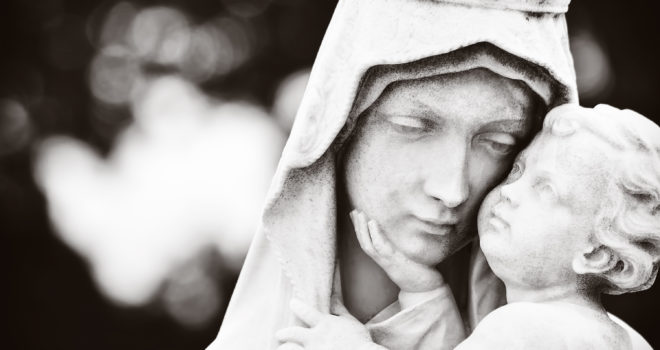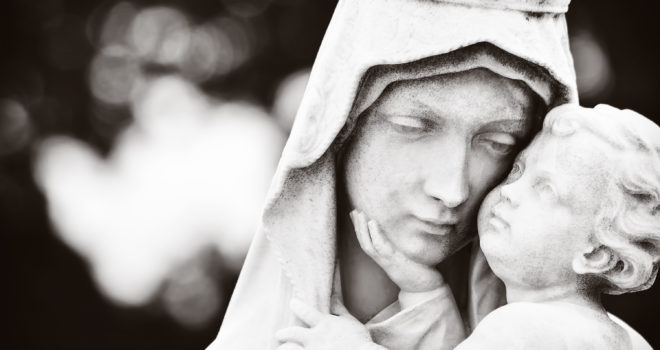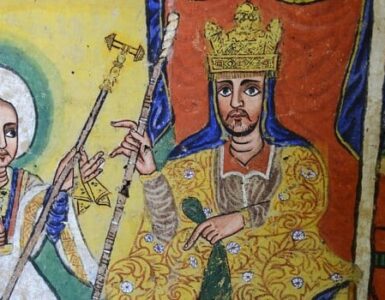Feast of the Santo Nino. January 15, 2023
Is 9:1-6, Eph 1:3-6, 15-18; Mt 18:1-5, 10
I was in the back seat of a car stuck in traffic when I made eye contact with a little boy who was standing at the roadside. He smiled at me, and I smiled back. Then we started waving at each other like long-lost friends reuniting in the traffic jam of Metro Manila. We kept smiling and waving at each other till we were out of sight.
We were exhibiting childlikeness, the ability to freely receive and give love to another. We were not worried about the intentions of our hearts or what the other would think. We were not concerned about status or language barriers or the fact that we were complete strangers to each other. We were simply expressing appropriate love for each other in the way that we could in that circumstance – by smiling and waving at each other.
The Santo Nino is one of the oldest and most popular devotions of Filipino Catholics. This devotion to the Holy Child Jesus celebrates God’s loving act in sending His only begotten Son to us in the form of an infant to make us His children and to show us how we are to live as His children. But are we really learning childlikeness from the infant Jesus?
The child Jesus receives everything from the Father, “Blessed be the God and Father of our Lord Jesus Christ, who has blessed us in Christ with every spiritual blessings in the heavens.” Jesus would also communicate to us all these gifts of love by His own death and resurrection, “Christ loved us and gave Himself up for us, a fragrant offering and sacrifice to God” (Eph 5:2). In this infant Jesus we too have become children of God and we too can freely receive and give love to God and others by our actions, “In love He destined us for adoption to Himself through Christ.”(See Eph 1:3-6)
Jesus strongly states that we cannot enter into His heavenly kingdom if we do not grow in this childlike spirit. When the disciples asked Him who was the greatest in the kingdom, He replied, “Amen, I say to you, unless you turn and become like children, you cannot enter the kingdom of heaven.” No matter our status in the Church or how much we do or endure for Christ in His building up His kingdom, we cannot even enter His kingdom if we do not have a childlike spirit.
So, we must seriously ask ourselves the following questions to gauge how much childlikeness we have attained.
Are we freely receiving the love of God that He offers to us? Are we open to receiving the love of God that He offers to us even as we face our sinfulness? Do the pains of life make us doubt or even question His love for us? How are we buying into the lie that we have to be good and holy to receive His love? How are we trying to earn that love of God for us by our actions instead of simply receiving it as a gift that it truly is? Are we so overcome with fear of what He will ask of us that we do not first receive His love as a gift? Are we even open to repeatedly receiving His merciful love for us in the sacrament of Reconciliation? How open are we to His mysterious love for us in times of pain and suffering?
Are we freely receiving the love that others offer to us? Do we really see others as a gift because God comes to us through them? Didn’t Jesus say, “Whoever receives one child such as this in my name receives me?” How do we allow past hurts to hinder us from receiving anew the gift of their love for us? How do we overcome that mindset that focuses on the intention of others in offering us their love? How do we allow complaining, grumbling, and rivalry to close our hearts toward the love being offered to us? How do we find ourselves wondering about the hidden intentions in the heart of those who offer us their love?
Are we freely giving love to God through our actions? How are we seeking to know and love God more as our Heavenly Father? Are we striving to love Him more through prayer and the sacraments? How firm is our resolve to do the will of God as far as we can grasp it at any given moment? What are we doing to make God better known and loved by others through our words and actions? Do we stop loving God because we do not seem to get any temporal benefits from Him?
Are we freely giving love to others through our actions? Do we sincerely seek the temporal and eternal good of others? Do we treat them as brothers and sisters out of love for God? Do we freely extend to others the merciful love of God that we have experienced? Do we heed the warning of Jesus not to “despise any of these little ones?” (See Mt 18:1-5, 10)
Childlikeness is always cultivated in the context of our relationship with God and with others. Nothing in this life humbles us, fills us with childlike trust in God, moves us to obedience, or makes us endure suffering in this life, more than God’s unconditional and unceasing love for us sinners. The love that others have for us also helps us to see the goodness that God has given to us and our common bond with each other.
It is only by living as children of God that we have inner joy, strength, and hope. We do not quit in the battle for righteousness and we do not allow the struggles of this life to kill the joyful hope that comes from having God as our heavenly Father. We have these and more as God’s children because we are fulfilling the will of God by journeying in the right direction toward our eternal home with God and the saints.
Jesus knows how hard it is for us to become childlike. He comes to us in every Eucharist with that love that humbles us and fills us with confidence in Him. It is a love that we do not deserve at all. But let us receive that love today and freely offer it back to God and others through loving action. This is what makes us children of God and privileged beneficiaries of His own joy, light, and strength.
Glory to Jesus! Honor to Mary!












